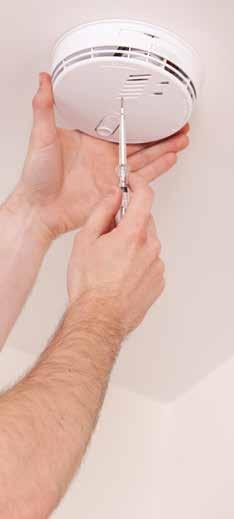YOUR ROLE
AS A LANDLORD If you’re looking at letting out a property, it’s important to understand just what your tenant expects from you as its landlord
THE UTILITIES
The gas, electricity and water companies should be advised whenever the property is empty so that meters can be read and accounts prepared. During ‘void’ periods, the utility services must be transferred back into your name, by you. Of course, the tenant is responsible for the gas, electricity and water/sewerage bills generated by their usage during the tenancy, and for changing the gas and electric accounts into their name when they move in. They’re also responsible for the standing charges. However, their liabilities in this respect clearly finish on the date they vacate the property.
As a landlord, it’s your responsibility to ensure that all electrics and electrical appliances supplied in the property are safe for use
TELEPHONE & COUNCIL TAX
Generally speaking, telephone companies will only deal with the account holder named on the account. You must tell the telephone company that you are leaving the property and advise them what you want to do with your existing number. The tenants are then responsible for arranging any line reconnections and meeting any costs associated with this. When it comes to council tax, this is not your responsibility while the entire property is let. However, if you still reside at the property while acting as a landlord, then you will remain responsible for the Council Tax charge.
PORTABLE APPLIANCE TESTING
As a landlord, it’s your responsibility to ensure that all electrics and electrical appliances supplied in the property are safe for use. If any portable appliances are going to be left in the property, a portable appliance test should be carried out by a qualified electrician on an annual basis.
GAS SAFETY CERTIFICATE
It’s your duty as landlord to ensure that all gas supplied appliances are maintained in a safe condition and are inspected at least every 12 months by a GAS SAFE engineer. A Gas Safety certificate should only be issued by a GAS SAFE engineer.
SMOKE ALARMS
The law requires landlords to install working smoke and carbon monoxide alarms in their properties. This includes smoke alarms being fitted in all hallway, stairway, and circulation areas that form escape routes from the property. They should be located every 7.5 metres of hallway, and within at least three metres of all bedroom doors. Properties where HMO licenses apply, a higher specification of smoke alarm installation may be required which is generally mains powered. Landlords are directly responsible for determining whether their properties are eligible for HMO status, and failure to adhere to the regulations may result in a civil penalty and render your insurance invalid.
LIFESTYLE MAGAZINE
15









